With a little over a month left till summer, I walked around the city center of Ekaterinburg under a snowfall like I haven’t seen in years. Even for hardcore Russia snow in April is a little too much. Not completely unexpected, but it’s definitely an “oh, common!” moment.
After half an hour outside, a one-inch layer of wet heavy snow was on my head and shoulders, getting inside my shawl and unpleasantly tickling the bare skin of my neck. I called Uber.
“What in the world is this weather!” I complained to the driver.
“Well, if it seems that bad for you, Ural people, imagine how I, a southerner, feel!”
“Where are you from then?”
“From Volgograd, moved to the Urals one and a half years ago.”
An Uber Ride to Remember
You know Volgograd, you might not know that you know it, but you do. Volgograd is the new name of Stalingrad. Rings a bell now?
The Battle of Stalingrad was, both figuratively and literally, the turning point in the course of Second World War. With almost two million people killed, wounded, and captured on both sides, it is considered the single largest and deadliest battle in the history of warfare.
Laurence Rees in his article “What Was the Turning Point of World War II?” quotes a British historian Max Hastings:
“Stalingrad changes everything. Once the Germans have been thrown back from Stalingrad, once they’ve lost that battle, the war was never the same again.”
“I’ve been to your city once at the age of ten,” I recalled the road trip with parents to see Mamaev Kurgan, a height overlooking the city of Volgograd. “Motherland Calls is my brightest memory of that trip,” which is unsurprising given that the memorial depicts a fierce woman with a raised sword in her hand, representing Motherland calling for her sons to defend the land. The statue is taller than both Statue of Liberty in New York and Christ the Redeemer in Rio-de-Janeiro.
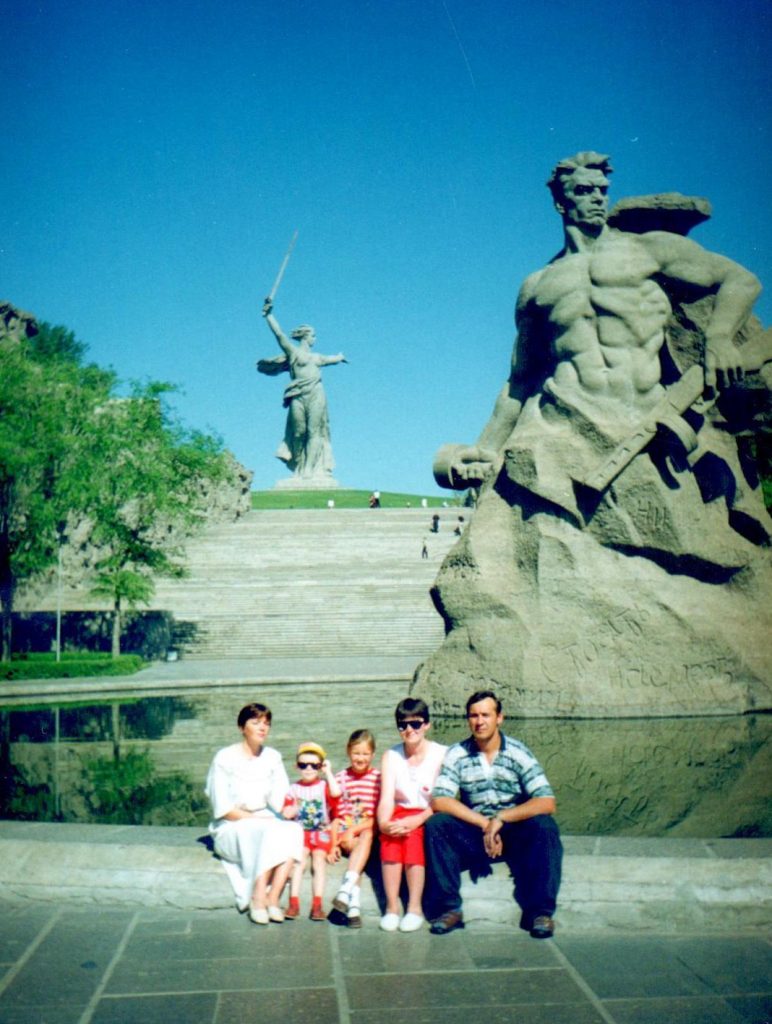
My parents, myself and our friends in front of Motherland Calls monument in Mamaev Kurgan.
“Did you know that even today you can find the remnants of the battlefield there? If you dig a little, you can discover shell casings, medals, documents. When I was seventeen, my friends and I were diggers,” my Uber ride was promising to be an interesting one. I blanked for a moment and then it dawned on me. They were digging out anything of historical value to sell to history buffs and even to the descendants of the deceased in the battle, on occasion.
“Once we came across a dugout shelter with six skeletons inside. It was built in September-October of 1942. During the Battle of Stalingrad it was bombed and covered by a thick layer of ground. The soldiers were essentially buried alive. They knew it was like being trapped on a submarine, that nobody will ever find them, save them.”
If before this point of our conversation I was trying to memorize a few of his lines to write down later, at the mention of a dugout I frantically started searching for recorder on my phone.
“All of the soldiers had documents on them. All of them were identified. We reported it to authorities and the bodies were reburied on Mamaev Kurgan. We were invited to the funeral. There was a wife of one of the soldiers, she was an old lady by that time. Turned out, they had gotten married just before the war started, on the 19th of June 1941. On the 22nd of June he was called up.
“After that I was catatonic. I swear, I stopped digging. I did a good thing by finding those boys and helping identify and rebury them. But this good deed was done accidentally. I have sinned a lot in my life, but I think this one deed will be counted as a good one.”
I was sitting in the back seat of his car completely awestruck.
“You know, Victory Day in Volgograd is very beautiful,” he continued. “There are still veterans — very few of them left — but when they parade on the 9th of May… I look at them… and inside it’s just… Thank you! Thank you for saving us from what could have happened.”
Genetic Memory
This year marks 73rd anniversary of the victory of the allies over Nazi Germany. In Russia, the time from 1941 to 1945 when Soviet Union fought for its freedom in the Second World War is referred to as the Great Patriotic War. On the 9th of May, we celebrate our victory. We celebrate it big.
In a famous Soviet song dedicated to the victory, there’s a line “this is a celebration with tears in our eyes”. It’s a happy day for my country, yet tears stream from everyone’s eyes.
I watch our soldiers running on a battlefield in a movie — I cry. I hear a Soviet war song — I cry. I see the last of the veterans who are at least ninety years old by now, wearing their uniforms covered in medals — I wail. It’s like fountains open up in my eyes without any warning.
The Great Patriotic War is one of those rare topics that makes my emotions find a very physical outburst. I get a lump in my throat and my stomach starts churning whenever I have to discuss it.
Does this sound strange? My mom says it’s genetic memory. In the article “Can We Access the Memories of Our Ancestors Through Our DNA?” Katherine Gillespie writes,
“Some psychologists, most famously Carl Jung, have theorised that we’re born with the memories and experiences of our ancestors imprinted on our DNA…
While you might not be able to remember the specific horrors experienced by a great grandfather in a WWI trench, or the weary footsteps taken by ancestors as they migrated from Africa to Europe, it’s not an uncommon thing to feel in touch with those whose genetic material you share. We define ourselves by things like race and family history, and sometimes those experiences of the distant past feel very present.”
Can this be true? Scientists are still debating, but I know how I feel. I feel very connected to those events and maybe the reason is that my own great grandfathers fought in WWII. In fact, there’s not one family in Russia (or any former Soviet republic for that matter) that did not suffer in the war in one way or another. Every single family has its heroes. Here are mine.
My Family Heroes
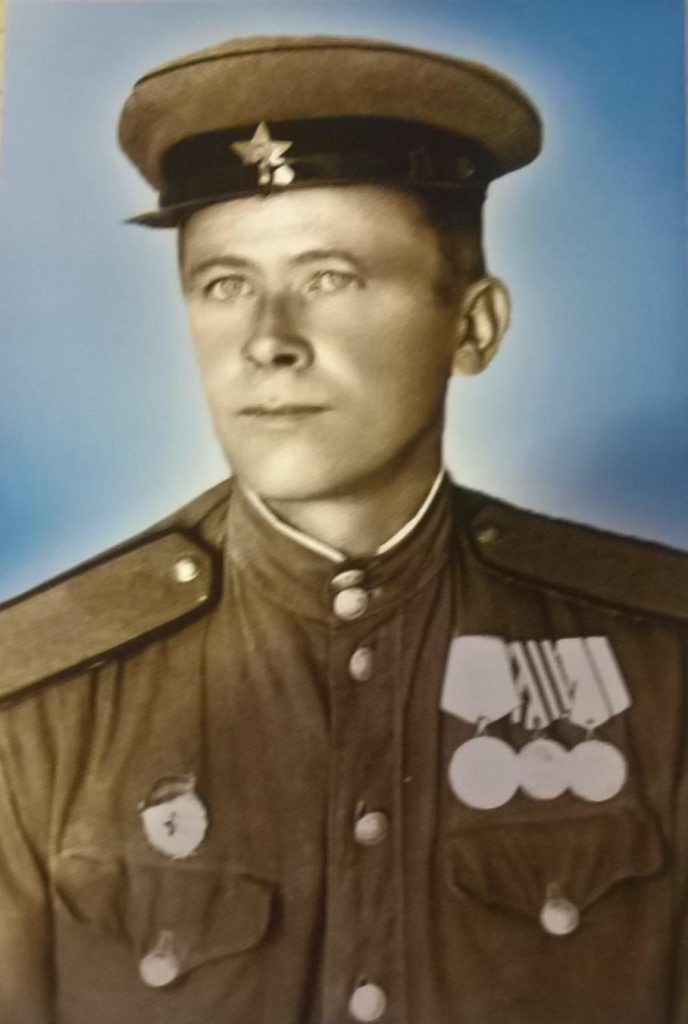
My great grandfather, Semyon Evstigneevich Beltikov, received combat decorations in the battle of Moscow, the battle of Stalingrad, liberation of Prague and Vienna offensive.
This is my great grandfather on maternal side, Semyon Evstigneevich Beltikov, born in 1911. By the time the war started he was thirty years old. Semyon and his wife Tatiana had a one-year-old son Vladimir and were expecting a second baby. Semyon was called up in August of 1941 before he could see his newborn daughter Valentina and returned home only four years later in September of 1945. As you might imagine, vacations, even to see family, were not an option at that time. My granny was born a year after he came back from war, in 1946. Unfortunately, Semyon died only two years later, so my granny doesn’t have any recollections of him and learned his story from the relatives.
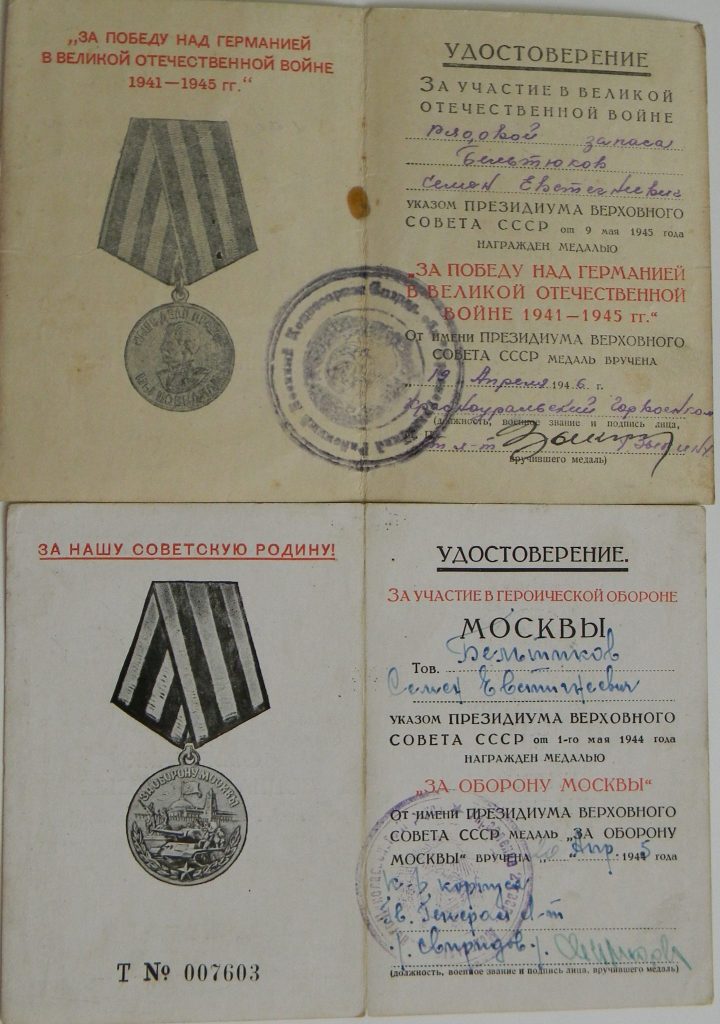
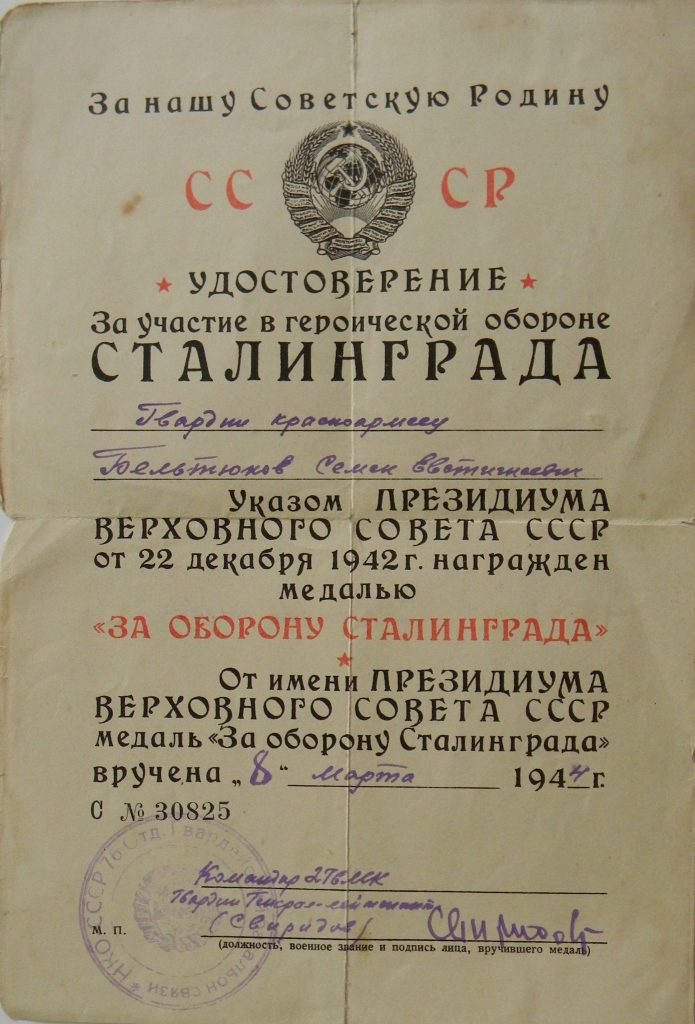
We were able to restore his journey using the official documents. Semyon Beltikov received combat decorations for taking part in the battle of Moscow and the battle of Stalingrad, for liberation of Prague (Czechoslovakia) and Vienna offensive (Austria). He also received a Medal for Bravery for his outstanding service as a field radio operator.

My great grandfather’s brother, Ivan Evstigneevich Beltikov, took part in the battle of Stalingrad, the battle of Kursk, liberation of Belarus and Poland, and Berlin offensive.
Ivan Evstigneevich Beltikov was Semen’s brother, born in 1913. Ivan was called up in 1941 and served till 1945 as a tank operator. After the war, when Semyon died, Ivan adopted my granny. She says that he was always reluctant to talk about the war, so gruesome were those events. But we know that he took part in the battle of Stalingrad, the battle of Kursk, liberation of Belarus and Poland, and Berlin offensive. Granny recalls that Ivan told her how he left his signature on the Reichstag.
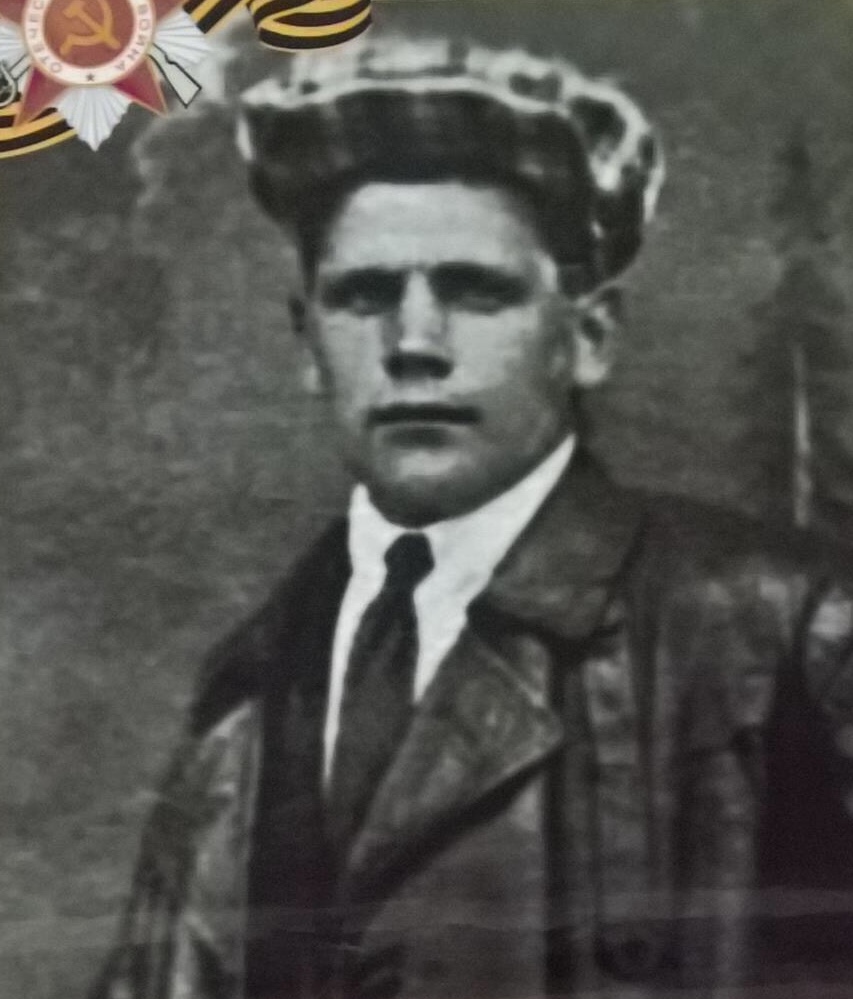
My great grandfather, Nikolai Anfilofievich Dyukov, was called up to war and reported missing in action in November 1941.
Dyukov Nikolai Anfilofievich is my great grandfather on paternal side. Unfortunately, we don’t know anything about him but the fact that he was called up and was reported missing in action in November of 1941.
I never met my great grandfathers, but I was lucky to meet Semyon and Ivan’s sister Polina, who was twenty at the time the war started and worked in an army hospital as a nurse. After the war she moved to Moscow, and my parents and I always stayed at her place whenever we visited Russia’s capital. As long as I remember myself, I remember auntie Panya, as we called her. She died only three years ago.
The Myths and Why They Hurt
Only in my family four people took an active part in WWII. When I say every Russian family has its heroes, I am not exaggerating. So raw and hurting those memories are that people refuse to forget. We want to remember, we want to be proud, and, as egoistical as it may sound, we want other people to know about these events too.
I went to Victory Day parades since I was a kid. I read books about war heroes like Zoya Kosmodemiyanskaya and Uliana Gromova that mom carefully chose for me in the library. In our school program the history of WWII took most of the year when I was in the 9th grade. I knew the course of every battle, the casualties on both sides, the exact dates of allies’ conferences and the protocol of Potsdam agreement pretty much by heart. I thought everyone else knows that too.
And then I started traveling. I am not silly to expect people all around the world to know the history of Russia. I, for one, didn’t know anything about the civil war in Sri Lanka until I moved there. But it hurts a lot when people know the history, but their history differs from mine.
I once listened to my American friend talk about the efforts of American army in WWII: “Something around 300 000 American people died in that war. Terrible, terrible…”
“That is terrible,” I agreed. “Do you know how many Soviet people died?”
She shook her head.
“Approximately 26 000 000 people”
There was a pause. I could see it in her eyes that this figure was so insane that she simply didn’t believe me.
“But if this number is right, then how come we don’t know about it?”
“Well, that’s my question. People in Russia know this number very well.”
The more I traveled, the more often I would meet people telling me such outrages stories that I didn’t even know how to reply at first. One of my “favorites” is that Soviet Union defeated Nazi Germany because winter started and it was too cold.
“So Germany attacked Russia…” my Colombian friend was describing the course of war, “And it was really cold…”
“When? In June of 1941?” I try to talk sense into him.
“Well no… winter came and the German army started retreating.”
“Wait, they didn’t start retreating till 1943. So the first winter was not that bad, and the second winter was still bearable, but then in 1943 it finally got cold?”
Confusion on his face.
“And then what happened?” I was seriously curios by this point.
“Then, the USA, Britain, and Italy joined too and defeated Nazi Germany.”
Whoa!
“So Italy was with the allies? Are you sure? Ok, now listen up, I’ll tell you what really happened.”
I heard the “it was too cold” argument on more occasions than I can count on my fingers and toes. I get outraged. Can you blame me? My great grandfathers left behind their wives and newborn children to fight tooth and claw, to freeze in trenches, and eat dirt so that today somebody told me “it was just too cold”?
Imagine if the USA lost 26 000 000 people in WWII. Do you have any doubts that every single person in the Universe would know about it? Yet, I come across articles like “Don’t forget how the Soviet Union saved the world from Hitler” in the Washington Post. Don’t forget… Outside of Russia and former Soviet Union republics people have to be reminded of what really happened in that gruesome war. It hurts a lot.
In the article, Ishaan Tharoor quotes the book of a British historian and journalist Max Hastings “Inferno: The World at War, 1939-1945”:
“The Red Army was “the main engine of Nazism’s destruction”. The Soviet Union paid the harshest price: though the numbers are not exact, an estimated 26 million Soviet citizens died during World War II, including as many as 11 million soldiers. At the same time, the Germans suffered three-quarters of their wartime losses fighting the Red Army.
“It was the Western Allies’ extreme good fortune that the Russians, and not themselves, paid almost the entire ‘butcher’s bill’ for [defeating Nazi Germany], accepting 95 per cent of the military casualties of the three major powers of the Grand Alliance.”
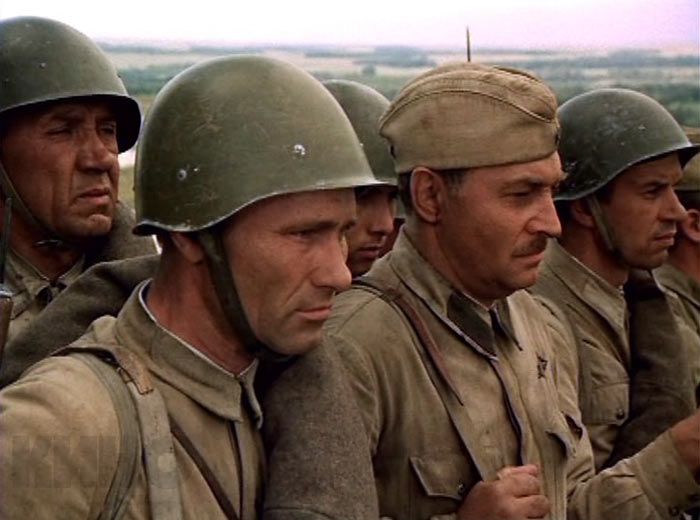
Frame from a Soviet movie “They fought for Motherland”
Quentin, We Have to Talk
When I think of innumerable acts of heroism of Soviet soldiers like the story of Pavlov’s house, an apartment building held by thirty Red Army soldiers against a heavy Wehrmacht offensive for 58 days; like the story of the last defender of Brest Fortress who came out to Nazi soldiers blinded because of the wound, with a gun in his hand, and Wehrmacht officers saluted the bravery of their enemy before he shot himself; like the story of Alexandr Matrosov, a nineteen-year-old boy who covered a German machine gun with his own body to let his unit start an offense and take over a village… I wish they were immortalized in movies. In today’s day and age it is the most effective way to learn. The problem is nobody but Russians watches Russian movies, and Hollywood isn’t too interested in portraying Russians as heroes. Russian mafia? Yes, please! Russians saving the world? Nah, I don’t think so.
You think of a World War II movie, Saving Private Ryan probably comes to mind. Then, Pearl Harbor or Inglourious Basterds. All great movies, but after watching the latter, I couldn’t help but wonder how many people left theaters thinking (spoiler alert!) that Hitler was actually killed by a bomb set in a movie theater by collective efforts of Americans, French, and Germans? Mr. Tarantino, could you include a Russian Ivan somewhere in the plot of your movie? Maybe next time? Pretty please?
It’s silly of me to get angry because Hollywood doesn’t make movies about Russians. American writers, directors, and producers understandably want to tell a story of their people. But I can’t help but feel sad that my own country and my own people were forgotten once again.
The one Hollywood movie about the Soviet efforts in WWII, Enemy at the Gates, has so many factual mistakes that my palm was permanently stuck to my face through the whole duration of the movie. As one review stated: “I wouldn’t recommend watching Enemy at the Gates to my worst enemy”.
If You Need Me, I’ll be at the Red Square
Maybe in part it’s our fault. We should be more vocal about this issue. We should make Hollywood-quality movies about the bravery of Soviet soldiers in WWII. As you probably have guessed by now, this post is part my desire to share the story of my great grandfathers and part an outcry to the world to, please, see what I am seeing, and to listen, and to learn.
Last year, on the 9th of May, I posted pictures of my grandad and his medals on Facebook with a few paragraphs about how proud I am of him and of Soviet soldiers for liberating my country and the world. It was the first time I posted something like this on the page of my blog and not on my personal page, thus widening the audience from my friends and family to hundreds of readers.
There were people who expressed their love and gratitude in comments. There were a few who said it was my post that opened their eyes on the amount of casualties in Soviet Union. And then, there were negative comments which I naively did not expect.
For many people it is hard to separate the victory of Soviet Union in WWII from the years of Soviet domination in Eastern Europe that followed. Yet, in my mind, the two couldn’t be further apart. It is important to divide the people and the government. The years of Stalin rule were the years of dictatorship. He repressed and killed as many (and more) of his own people as in Eastern Europe, including Soviet soldiers and generals who returned home from the war. In no way, what happened after the war diminishes the heroism of millions of Soviet people who sacrificed their lives to protect my Motherland and, yes, the world at large. One million Soviet soldiers died liberating Europe. Those peoples’ deaths matter. They deserve our gratitude.
After that post on Facebook I felt both inspired to write more and scared at the same time. If a few lines caused so much negativity, what will happen if I write an article? Luckily, earlier this year I promised to be brave and talk about the topics that matter. This matters. This is my truth and I stand by it.
On the 9th of May I’ll be on the Red Square with the portraits of my great grandfathers walking with Immortal Regiment. I remember. I am proud. I am forever grateful for the Victory.





Yulia! Brilliantly written! Do you have this post in Russian as well? My parents would love to read this and see that someone finally is telling the rest of the world about how heroic Russian people were during WWII!
Thank you, Sasha! It means the world coming from you. I was actually thinking of you and your family on the back seat of that Uber. Victory Day in Volgograd must be really amazing. Unfortunately, I don’t have a Russian version, at least for now, but my mom read it through Yandex Переводчик and said it does a pretty good job translating the article.
I am grateful for this lesson
Thank you and your family for helping this world
Thank you for these kind words! I personally haven’t done anything, just trying to make more people aware.
<3
Beautiful story Yulia. I love your line: “so raw and hurting those memories are that people refuse to forget.” I also feel I want to cry every time I think of my grandfather Krstivoje Ognjanovic, who fought Nazis during the occupation of Serbia in April 1941. Along with 300,000 Serbian soldiers and officers he was deported to the concentration camps to serve a slave labor for the Hitler’s war machine. My grandfather was liberated in 1945 by the Soviet forces; then, he returned to his village in Serbia, and had eight children. The heroism of millions of Russian and Soviet people who sacrificed their lives to protect the World from the pure evil of Nazism is eternally remembered. Deeply imprinted in my DNA.
Milomir,
thank you so much for sharing your family’s story! When I write personal posts like this one I can only hope that it will resonate with someone else. Your comment means the world to me.